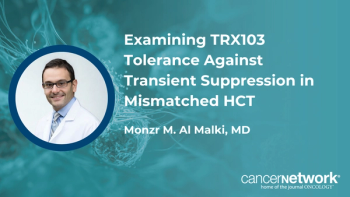
PFS With Ibrutinib Combo is ‘Promising’ in Chronic Lymphocytic Leukemia
Ibrutinib plus venetoclax appears to be effective across the overall chronic lymphocytic leukemia population in the CAPTIVATE study, although progression-free survival is shorter for those with TP53 mutations.
During the
According to Ghia, a full professor in Medical Oncology at Università Vita-Salute San Raffaele, and the deputy chairman of the Division of Experimental Oncology at IRCCS Ospedale San Raffaele, Milano, fixed-duration therapy with ibrutinib plus venetoclax appeared to be effective across the general study population. However, the PFS rate was lower for those with TP53-mutated disease; he suggested that further follow up may be necessary for this patient subgroup.
The 54-month PFS rate was 70% (95% CI, 62%-77%) in the fixed-duration cohort (n = 159) and 45% (95% CI, 25%-64%) in those with a TP53 mutation or 17p deletion (n = 27). Additionally, investigators reported corresponding rates of 68% (95% CI, 50%-80%) in patients with unmutated IGHV (n = 40), 64% (95% CI, 30%-85%) in those with an 11q deletion (n = 11), and 60% (95% CI, 41%-75%) in a group of patients with complex karyotype.
Transcript:
We also presented the data about progression-free survival. Now, of course, we all want to know how long patients remain off therapy and whether they [will] progress. After a fixed-duration treatment and 54 months of follow up, 70% of the patients are still responding; patients with unmutated [IGHV], 68% are still responding. Patients with TP53 aberrations are losing a little bit of response earlier; still, 45% of them are responding after 54 months of follow up.
These are very promising data. The fixed-duration treatment with ibrutinib plus venetoclax appears to be very effective in virtually all patients. Maybe we have to evaluate the effect [of the combination] a little bit longer in patients with TP53 aberrations.
Reference
Ghia P, Wierda WG, Barr PM, et al. Relapse after first-line fixed duration ibrutinib + venetoclax: high response rates to ibrutinib retreatment and absence of BTK Mutations in patients with chronic lymphocytic leukemia (CLL)/small lymphocytic lymphoma (SLL) with up to 5 years of follow-up in the phase 2 Captivate study. Blood. 2023;142(suppl 1):633. doi:10.1182/blood-2023-187128
Newsletter
Stay up to date on recent advances in the multidisciplinary approach to cancer.










































